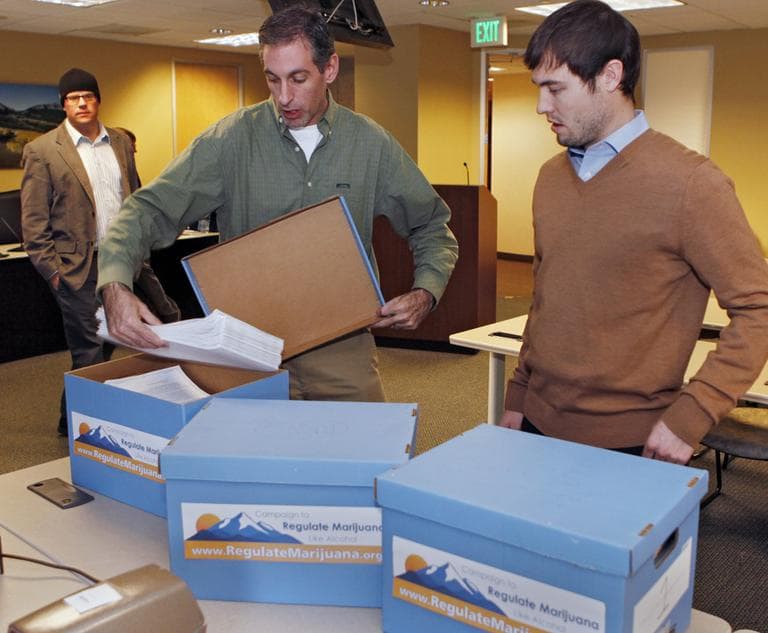Advertisement
Ballot Questions Ask Voters About Marijuana, Same-Sex Marriage
Resume
Legalized marijuana, same-sex marriage, doctor-assisted suicide and tax reform are among the 174 ballot questionsthat voters will decide in the general election on November 6th.
In 24 states, citizens can get laws on the book – and in some cases propose constitutional amendments – by collecting signatures and putting measures before voters, through the initiative process.
Forty-nine states also have a referendum process, where the legislature puts issues before voters.
Marijuana Votes Could Be A Bellwether
Seventeen states already have medical marijuana laws on the books, but now Colorado, Oregon and Washington want to expand that to recreational use.
"These measures are all very similar to what was on the ballot in California two years ago," Jennie Bowser of the National Conference of State Legislatures told Here & Now's Robin Young. "Proposition 19 would have legalized the use and sale and possession of marijuana for anybody age 21 or older, and regulated it and taxed it much the same way alcohol is regulated and taxed."
The measure failed in California, but polls show the initiatives are leading the polls in Colorado and Washington. If the measure passes in those states, it could serve as a bellwether.
"That's probably what legalization proponents are hoping for, that they can assemble a critical mass of states that have approved this and that might be the wedge to push the federal government to act on it. Because even if these states do legalize marijuana, it's still illegal under federal law," Bowser said.
Three states are voting on medical marijuana, including Arkansas, which is the first southern state to consider it.
Changing Attitudes On Same-Sex Marriage
Five states have same-sex marriage propositions on the ballot this year. According to Bowser, over the last 15 years, about 30 states have considered constitutional bans on same-sex marriage. A ballot question in Maine will be the first that asks voters whether they would like to legalize same-sex marriage. In all but one of the states that have considered bans on same-sex marriage, voters agreed to restrict marriage to opposite sex couples. The exception was Arizona, where voters said no to a same-sex marriage ban in 2006, but then came back and approved a ban in 2008.
Polls indicate that support for same-sex marriage is growing. According to Bowser, a 2001 poll by the Pew Center on the States, asking people how they felt about same-sex marriage, found 35 percent of people polled supported same-sex marriage, while 57 percent opposed it. In 2012, opinion has shifted, with 46 percent supporting same-sex marriage and 44 percent opposing it. Bowser said state-specific polls on these ballot questions are also showing notable departures from the past. In Maine, 53 percent support same-sex marriage. In Maryland, 54 percent support same-sex marriage, and in Washington, it's 56 percent. Minnesota's polls are in statistical tie.
"If you measure how many people vote in support of same-sex marriage, that number's been creeping up ever since 2005," Bowser said.
Many Tax Reform Questions Would Benefit Education
According to Bowser, many of the tax increases proposed in ballot questions this year would direct the new revenue to education programs, and that could help them pass.
"Voters view tax increases that benefit education in a somewhat more favorable light than general tax increases," said Bowser.
Guest:
- Jennie Bowser, senior fellow at the National Conference of State Legislatures
This segment aired on October 8, 2012.